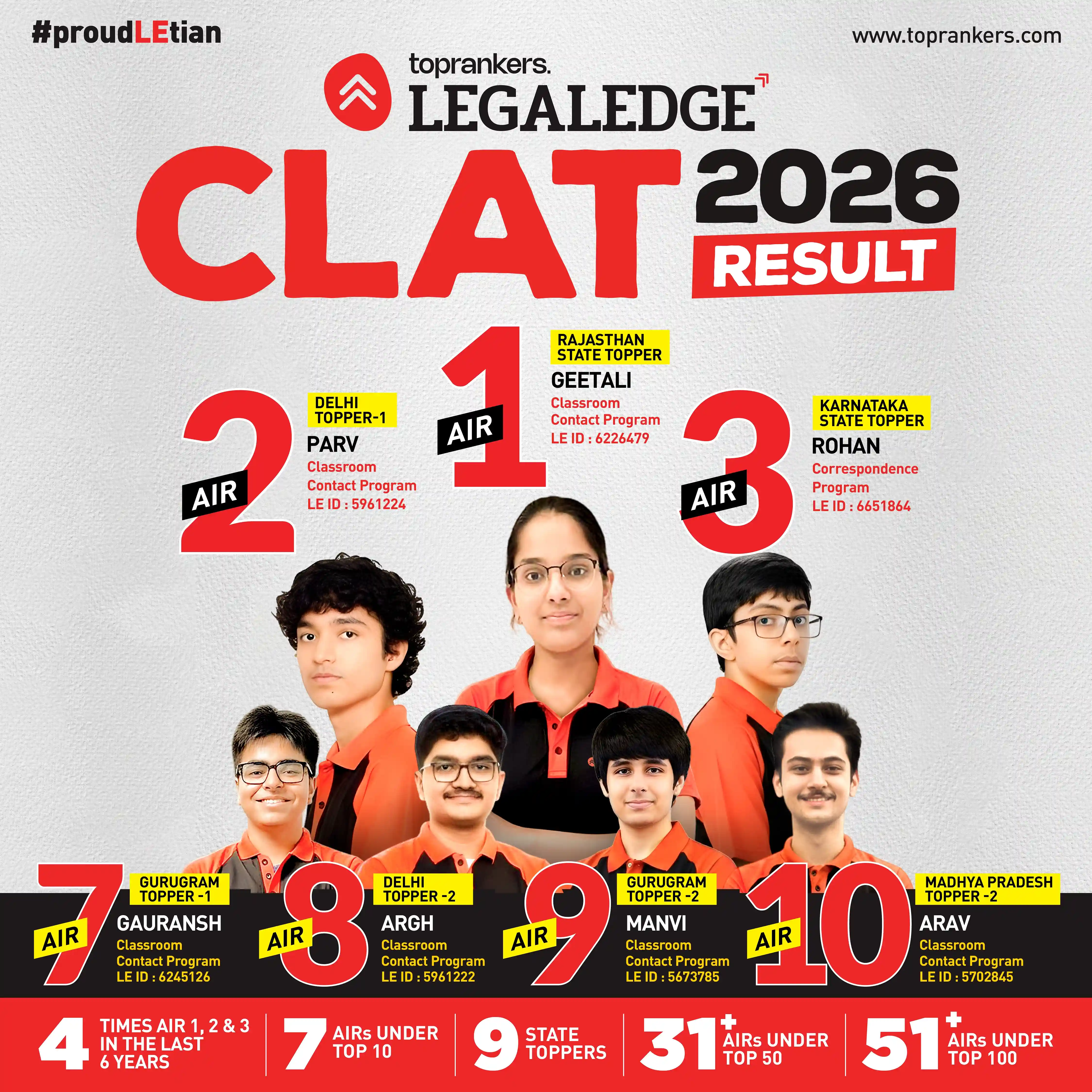CLAT Time Management Tips And Tricks 2026 By Toppers
October 17, 2025
Reader's Digest - Mastering CLAT time management tips is crucial for success in the exam. Learn how to optimize your study schedule and allocate time effectively for each section to ace the CLAT.
As the competition for the CLAT exam is increasing exponentially, you must put your maximum effort into the exam to deal with the competition and come out with flying colours.
Effective time management is vital to securing a good entrance exam rank. Also, it will help you boost your confidence, set priorities, and reduce stress levels.
This post will provide the best CLAT time management tips, smart ways to solve lengthy passage-based questions, and more.
So, why late? Let's dive into the post for simple tips and tricks that will help enhance your time management skills.
What Should be Your Approach to CLAT Exam 2026?
Many of you may perform well in sectional tests, but you cannot reach the expectation when attempting a complete CLAT Question Paper. This is due to consuming more time for any section and having no time for other areas.
Time management, both within and outside the exam, is necessary to ensure greater chances of success. Time management on the part of an aspirant ensures that enough appropriate time has been allocated to each concept and, in the paper, to each section.
The CLAT time management tips below will help you better understand how to manage time to succeed in the Common Law Admission Test 2026:
- Note weak and strong sections separately. This can help you proceed with the easier and more confident section first.
- Have a rough plan on how much time to spend on each section.
- Since the question paper includes comprehension-based questions, read and understand the passage in one go.
- The best way to improve your time management skills is to practice Mock Tests and previous years' papers. Set a timer while you do so.
- Improve reading and comprehension skills by regularly reading newspapers or magazines.
- You know your speed, improve your reading skills, and solve questions of different difficulty levels.
- Before starting, quickly read the instructions to avoid misunderstanding the questions or marking scheme.
- Keeping calm during the exam is vital. If you feel stressed, take a few deep breaths to relax. Panicking can waste time and impair your ability to think clearly.
CLAT Time Management Tips to Manage Stress
Feeling stressed or overwhelmed during the CLAT entrance exam is the most common in most of you. But remember, feeling stressed sometimes is also good for our brains.
Create a realistic and well-structured study plan that includes breaks and leisure activities. A balanced schedule prevents burnout and keeps stress levels low.
Regular physical exercise, adequate sleep, and healthy eating can significantly impact your stress levels and overall mental health. These should be integral parts of your preparation.
Incorporate mindfulness practices such as meditation, deep breathing exercises, or yoga into your daily routine. These practices can reduce stress and improve concentration.
Simulate exam conditions at home to get accustomed to the pressure of the CLAT. This practice helps reduce anxiety as you become more familiar with the exam format and time constraints.
Aim for progress, not perfection. Setting achievable goals for each study session can reduce feelings of overwhelm and increase your confidence.
What is the Smart way of Solving Comprehension-Based Questions in CLAT 2026?
Solving comprehension-based questions in the Common Law Admission Test (CLAT) efficiently is crucial since these questions test your reading, understanding, and analytical skills. The CLAT examination has shifted its focus towards evaluating candidates' abilities to comprehend and analyze passages across various sections, including English, Current Affairs, Legal Reasoning, and Logical Reasoning. Here's a smart approach to tackle comprehension-based questions in the CLAT:
- Skim the Passage First: Initially skim through the passage to get a general idea of its theme, tone, and structure without focusing too much on the details. This will help you save time and understand the context.
- Read the Questions Carefully: Before diving deep into the passage, read the questions to know what you're looking for. This can help you to be more focused when you read the passage in detail.
- Note Keywords and Phrases in Questions: Highlight keywords and phrases in the questions. When you go through the passage again, these keywords can guide you to the relevant parts of the text.
- Detailed Reading Based on Questions: Now, read the passage more carefully, paying special attention to the parts likely to contain the answers to the questions you've read. This focused approach saves time and improves accuracy.
- Answer Questions by sticking with passage information: Base your answers on the information provided in the passage. Avoid relying on prior knowledge or assumptions not supported by the text.
- Eliminate Wrong Answers: Use the process of elimination to narrow down your choices. Discard options that are clearly incorrect, irrelevant, or contradictory to the information provided in the passage.
- Manage Your Time: Allocate your time wisely. Don't spend too much time on one question. If you're stuck, move on to the next question and return later if time permits.
- Practice Regularly: Regular practice with comprehension passages from previous years' papers and mock tests can significantly improve your speed and accuracy.
- Learn from mistakes: After practising, review your answers, especially the incorrect ones. Understand why you got a question wrong and how you can avoid similar mistakes in the future.
- Stay Calm and Confident: Approach each passage with confidence. Staying calm can help you read and comprehend faster, as stress can impede your ability to understand and analyze the text effectively.
Section-Wise CLAT Time Management Tips 2026
Before attempting the paper, use the time given to read it. Please read it with focus. Allot time for all the sections in which you will finish it. It is essential to allocate time to each section previously.
The following are some of the best tips to crack the CLAT exam on the first attempt:
- Finish the Legal Reasoning sections within 30-35 minutes.
- English Section is easy most times. So, strive to finish it in 20-25 minutes.
- GK must not take more time than 10 minutes.
- Quantitative Techniques should be solved within 15 minutes
- Logical Reasoning section sold be solved within 25-30 minutes.
- Give the rest of the time to attempt the skipped questions.
- If a question seems tricky and time-consuming, do not waste time on it. Move on and solve it in the end.
- Skip the question rather than fill in the wrong answer. Do not forget that Negative Marking applies to the paper.
- Also, there is no sectional cut-off, which is another reason to skip questions. If attempting, ensure it is an educated guess you take, not a wild one.
- In the reading time, ensure to go through the passages once. Later, you can skim the course once again when you start answering.
CLAT Time Management Tips: Divide the Time for Each Section
- Allotting time for each section is the first step toward optimizing your time in CLAT.
- You should adhere to the time specified for each section above and move on to the next section once the time has lapsed.
Read more: Important time and work questions for CLAT exam
CLAT Time Management Tips: Allot Time for Each Passage
In this step, you must allocate time for every passage in each section. This will help you attempt the questions on a priority basis.
- Also, it will help you understand the questions you can answer first and quickly.
- Try to finish the easier passages first and then move to trickier ones.
Read more: Most important legal reasoning questions for CLAT
CLAT Time Management Tips: Understand the Question in the First Reading
Before answering any question, one should read it, focus, and understand it. Answering a question with unclear observation is dangerous.
- Develop a habit of understanding the depth of problems and drawing their solutions.
- Do not hurry when it comes to attempting problems. No matter if it is during practice or the actual exam.
- Revisiting the passage or question is an unnecessary usage of time that could be better allocated to understand and solve other portions. Use your alert meta while reading the passage so you comprehend it in one go.
- The seriousness and mindset during the preparation directly impact the actual exam.
- Cramming never works, especially when it is an essential exam like CLAT Entrance Exam.
- Deep knowledge of the basic concepts is a positive pathway to cracking the exam.
- One does not have much time to spend reading questions again and again. So, ensure you read it, focusing on it the first time.
- Concentration is an essential aspect of CLAT time management tips. Soak the questions in the first reading.
CLAT Time Management Tips: Practice Mock Tests
Mock Tests are the best way to fuel your preparation. Set a timer when you attempt CLAT Mock Tests and finish it on time.
Practising mock tests will help you understand the difficulty level of questions and the type of questions asked in the exam.
Mock tests are a perfect parameter to understand how long you take for each section and to figure out the best strategy for yourself while maintaining sectional timings. Please ensure you are honest with the clock.
Also, it will help you understand how much time you are required to attempt each section.
CLAT Time Management Tips 2026 to Follow on the Day of the Exam
There are a few CLAT time management tips that you can follow on exam day. You can go through the CLAT Exam Day Instructions from the post below.
- Do not revise anything new at the end of the hours.
- In the exam hall, try to be calm and silent.
- Do not indulge in any talks at the exam hall.
- Talking about the exam, especially, can build the pressure of attempting it. So, avoid conversation anyway.
- Before the exam, do not get into negative thoughts, talks, quotes, etc.
- Do not guess in the exam. Take the problem, understand it and then answer it. If it does not get into the mind, leave it. Do not play a guessing game.
- Do not jump on sections. Attempt one section, then move on to the other one. Otherwise, it will create confusion.
- Do not stick to questions. Move on. Keep solving. Mark the time-consuming questions. Solve them later
- Be positive. Things will work out.
Conclusion
In conclusion, effective time management is crucial when preparing for the CLAT 2026 examination. By following these CLAT time management tips, you can enhance your study routine and maximize your chances of success.
Key takeaways:
- Prioritize study material based on importance and difficulty.
- Create a well-structured study schedule with allocated time slots for each subject.
- Utilize effective study techniques such as breaking down complex topics and practising with mock tests.
- Seek guidance from mentors or teachers when needed.
- Maintain a healthy work-life balance and take regular breaks to avoid burnout.
- Stay disciplined, consistent, and positive throughout your CLAT preparation journey.
Frequently Asked Questions
How many hours should I study for CLAT Exam?

Is 1 month enough for CLAT Preparation?

Do really solving mock tests will help improve my time management skills in the CLAT exam?

How many times can I appear for CLAT?

Is the CLAT exam easy?

How can I overcome CLAT exam stress?

What are the best CLAT Time Managements Tips?







SHARE